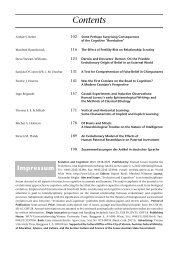The Seven Sins of Evolutionary Psychology - Konrad Lorenz Institute
The Seven Sins of Evolutionary Psychology - Konrad Lorenz Institute
The Seven Sins of Evolutionary Psychology - Konrad Lorenz Institute
Create successful ePaper yourself
Turn your PDF publications into a flip-book with our unique Google optimized e-Paper software.
Chris MacDonaldMexyzYoux y z0 1 30 1 31 2 11 3 12 1 05 1 0changed your behaviour unilaterally. <strong>The</strong> only wayeither <strong>of</strong> us can improve our own situation is for both<strong>of</strong> us to agree on a new equilibrium. BINMORE’s claimis that moral norms are coordination mechanismsthat allow us to deal with quandaries such as this.According to BINMORE, moral norms are coordinatingconventions for the selection <strong>of</strong> equilibria. Thisis the functionalist description <strong>of</strong> moral standards towhich an evolutionary perspective leads us. But howcan we endorse a perspective that ‘reduces’ moralityto convention? We turn to this question next.4.2 Social conventionsFigure 1: Choosing a Social Contract. <strong>The</strong> pay<strong>of</strong>f pairs are{pay<strong>of</strong>f to me, pay<strong>of</strong>f to you}, where pay<strong>of</strong>fs are assumed tocorrespond to preferences. 5 is best, 0 worst.toward a social contract, then x, y, and z representdifferent sets <strong>of</strong> rules that we could each choose tolive by.In this case, the outcomes {z,x} (at bottom left),{y,y} (centre), and {x,z} (top right) are all ‘equilibria’.That is, for each <strong>of</strong> those pairs, my choice is my bestpossible reply to your choice, and your choice is yourbest possible reply to my choice. For example, if Ichoose z, you are best <strong>of</strong>f if you choose x, and if youchoose x, I am best <strong>of</strong>f if I choose z. Equivalently, wecan say that if you and I are already in a situationwhere I am playing x and you are playing z, neither<strong>of</strong> us can benefit by unilaterally changing his behaviour.<strong>The</strong> same is true for the outcome pairs {y,y} and{x,z}.(This game would be a simple matter <strong>of</strong> coordination,were it not for the fact that the pay<strong>of</strong>fs in two<strong>of</strong> the three equilibria are asymmetrical. If the pay<strong>of</strong>fsin all three equilibria were symmetrical, then wewould find it easy to agree which equilibrium wasbest: it would just be a matter <strong>of</strong> coordinating ourefforts. 11 As it stands, the example above poses a hardmoral problem.)In the example at hand, we know that we’re better<strong>of</strong>f cooperating than not cooperating, but we disagreeover which project to cooperate on (i.e., whichsocial contract to choose). If we are currently bothplaying y, (i.e., in the centre <strong>of</strong> the matrix) then Iwould prefer that we move to the lower–left <strong>of</strong> thepay<strong>of</strong>f matrix, but I can’t move us there by myself.Changing my behaviour unilaterally would makeme worse <strong>of</strong>f. Similarly, you would prefer that wemove to the upper–right <strong>of</strong> the pay<strong>of</strong>f matrix, butyou would be worse-<strong>of</strong>f than you are now if you<strong>The</strong> term ‘convention’ has been much abused incommon parlance and in various literatures. It is<strong>of</strong>ten used as a synonym for ‘custom’ or ‘fashion’ or‘habit.’ As used by moral philosophers, it <strong>of</strong>ten has aderogatory flavour; the principles justified withinthe framework <strong>of</strong> one or another moral theory, forexample, are <strong>of</strong>ten contrasted with ‘mere social convention’.Both the sloppy and pejorative usages areunfortunate. We should seek to reclaim this undervaluedconcept, for use in both moral theory andapplied ethics. For our purposes here, we will givethe concept more content, differentiating conventionsfrom traditions, customs, norms, prejudices,and other such regularities <strong>of</strong> behaviour and belief.Conventions, here, will be defined in the HUMEANsense as regularities <strong>of</strong> behaviour, sustained by ashared interest in coordination and an expectationthat others will cooperate. Conventions, then, canbe defined in terms <strong>of</strong> these three key concepts: aregularity <strong>of</strong> behaviour; an interest in coordination;and an expectation <strong>of</strong> cooperation. <strong>The</strong> degree towhich various conventions will embody these threecharacteristics will vary, but all three characteristicswill always be present to some degree. Examples includethe everyday conventions <strong>of</strong> lining up atbanks, keeping promises, and buying alternatingrounds <strong>of</strong> beer at the pub, as well as such seriousconventions as avoiding killing non-combatants inwar. 12 Each <strong>of</strong> these ways <strong>of</strong> acting is useful for allconcerned; none <strong>of</strong> them is strictly arbitrary, nor isany <strong>of</strong> them necessarily optimal. Like these examples,many <strong>of</strong> our accepted moral obligations cannotbe understood except as the product <strong>of</strong> a convention.<strong>The</strong>y are best seen as adequate responses to socialexigencies. <strong>The</strong> unifying characteristic <strong>of</strong> each <strong>of</strong>these situations is, roughly, a surprising degree <strong>of</strong>social cohesion or order. In each situation, the interests<strong>of</strong> the individuals involved would, on some description<strong>of</strong> the situation, lead us to expect a veryEvolution and Cognition ❘ 102 ❘ 2001, Vol. 7, No. 1








